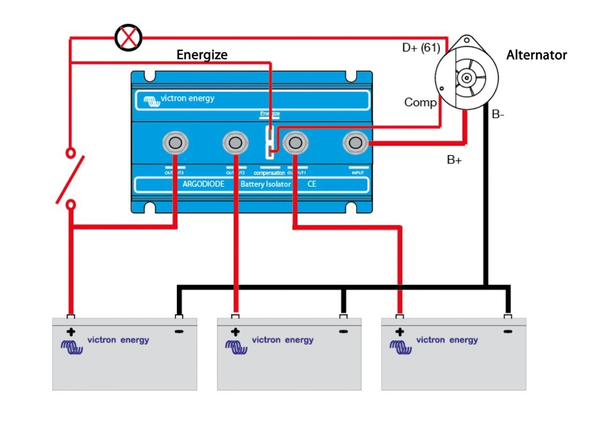Sale of Battery Isolators & Charging Distributors for Boats
Here you will find a wide range of high-quality battery isolators and charging distributors specifically designed for use on boats. We collaborate with renowned manufacturers to offer you the best selection of products that meet your boat's power management needs.
Our range includes:
- Battery isolators. These devices are essential for effectively managing the charging process and distributing power between different batteries on your boat. With our battery isolators, you can ensure optimal battery performance and prevent energy loss.
- Charging distributors. Our charging distributors provide efficient distribution of electrical power among multiple batteries. They help maintain a balanced charging and discharging process for each battery, ensuring optimal power supply.
- Intelligent power management systems. Some manufacturers offer advanced charging distributors with intelligent features. These systems can monitor battery conditions, automatically adjust charging parameters, and provide valuable information to maximize battery life and performance.
- Durable and reliable solutions. We adhere to principles of quality and reliability in the products we offer. Our battery isolators and charging distributors are built for durability and reliability in the marine environment.
- Compatibility and customization options. We understand that every boat is unique, so we provide various options and configurations to match different boat sizes, battery setups, and power requirements. You can choose the most suitable combination of battery isolators and charging distributors to meet your specific needs.
We strive to provide you with exceptional products and superior service. Our knowledgeable team is always ready to assist you in selecting the right battery isolators and charging distributors for your boat, ensuring a reliable and efficient electrical system.
About Battery Isolators & Charging Distributors
A complete discharge of a battery after about 4-5 times often leads to it failing and ceasing to perform its intended functions - to be an uninterrupted source of energy. Even a single deep discharge of a battery takes up to 5% of its original service life. This is why it is necessary to use protective devices - battery isolators and charger distributors.
Why Are Battery Protection Devices Needed on a Yacht?
It’s not a coincidence that experts from the topRik marketplace refer to Victron Energy products when describing the types of protective devices for boat batteries, as today it is one of the leading companies in this field. The marketplace also has a wide selection of battery insulators and charger distributors from Uflex, FNI and others - the best we have selected for you in the field of equipment for boat electrical systems.
Depending on the type of battery insulators and charger distributors, they can perform various functions, the purpose of which is to prevent the battery from completely discharging and to ensure an uninterrupted supply of energy to all electrical equipment of the boat.
Protecting Your Boat from Corrosion
The protective grounding conductor in an alternating voltage circuit provides a path for current to ground and removes dangerous electrical potential from the frame of faulty equipment. In TN electrical systems, the protective conductor is connected to the same ground as the neutral of the power source, which for the boat is the shore connection column, inverter or onboard diesel generator.
Connecting the onboard PE conductor to ground not only protects people on the boat from electric shock, but creates a galvanic connection between adjacent vessels and causes corrosion on board.
To protect your boat from corrosion, you can use a charger, an isolation transformer, or a diode-based galvanic isolator.
A semiconductor diode conducts current when the voltage applied to it in the forward direction exceeds 0.5-0.7 Volts. Current will flow through two diodes connected in series if the voltage drop across them exceeds 1 Volt. In a galvanic isolator, two pairs of diodes are connected in parallel towards each other. Thus, an insulator installed on the protective grounding conductor blocks the voltage arising both from the side of the boat and from the shore.
In a normal situation, the voltage across the diodes is less than 1 Volt, and they are locked. The circuit with the shore is broken, galvanic current does not flow through the protective conductor and there is no source of corrosion on the boat. But as soon as a leak or short circuit occurs in the on-board AC circuit, the voltage on the diodes increases, they open and the current flows freely into the ground.
In professional galvanic insulators, a capacitor is always installed parallel to the diodes. Capacitors pass alternating current but do not conduct direct current. Therefore, if an alternating voltage of small amplitude appears in the PE conductor, the alternating current goes to ground through the capacitor, and the direct current is blocked by diodes. The corrosion protection thus continues to work.
Capacitors are designed for a certain amount of current and voltage. If the actual values are higher than the nominal values, the diodes will open and the corrosion protection will no longer be effective. However, the grounding conductor will continue to perform its function and protect against electric shock.
The connection with the shore grounding system will remain even when the diodes fail, but remain in a conducting state. But if they become open as a result of damage, the protective grounding will be lost, resulting in a fatal risk for those on board. To prevent this, the galvanic isolator must inform the vessel owner of its current condition.
Disabling Non-essential Loads from the Battery
This is how the Smart BatteryProtect security device works: by disconnecting non-essential loads from the battery, the device prevents deep discharge of the battery, preventing damage and maintaining the necessary charge to rotate the starter of the boat electric motor.
For example, Smart BatteryProtect 12/24V-220 A can withstand peak currents of up to 600 A for 30 seconds. It protects the battery from over-discharge and can be used as a system-wide switch.
This type of protection isolates the battery from non-essential loads before it is completely discharged (which can damage the battery) or before it has too little energy left to start the engine.
When using Bluetooth during setup, Smart BatteryProtect can be set to any required enable/disable levels. You can also use one of nine preset on/off levels, using the contact wire for selection.
Parallel Use of Several DC Sources
Two or three batteries on a modern boat or yacht are the norm. Starting, service and additional batteries serve as energy sources for different types of equipment and operate independently of each other. Isolation devices - relays and charging insulators - allow you to simultaneously charge all battery groups from a generator with one output.
The operating principle of decoupling relays and diode isolators is different. The relay passes all the current through itself, and the insulator divides it into several branches.
But both devices have a common drawback - they try to charge two batteries at the same time and do not take into account the differences between them, as a DC-DC charger does.
As a rule, the starting battery is almost always fully charged, while the service battery, on the contrary, is very discharged. A higher starting voltage confuses the alternator regulator into estimating the condition of the combined battery better than it actually is.
The second drawback is more inherent in diode-based charging insulators. The voltage drop in the diode separators significantly reduces the charging rate of the batteries, and therefore leads to their incomplete charging.
Victron Energy developers have addressed the problems of diode insulators.
For example, diode battery combining units - Diode Battery Combiners - provide stable power to the yacht's electrical system even if one of the DC sources fails.
Diode Isolators allow the simultaneous charging of two or more batteries from a single generator without connecting the batteries together. For example, draining the auxiliary battery will not also drain the starter battery. The use of Schottky diodes ensures a low voltage drop.

Simultaneously Charge Two or More Batteries from One Generator
That’s how Argofet isolators work, which allow the simultaneous charging of two or more batteries from one generator (or from one charger output) without connecting the batteries together. Unlike diode insulators, Argofet insulators have virtually no voltage loss. Voltage drop is less than 0.02 V at low current and 0.1 V – for higher current.
We should also mention control and monitoring equipment - such equipment not only monitors and reports the condition of the associated equipment, it also “has the right” to shut down if the system is in danger, that is, it functions as a system-wide switch.
How to Choose Battery Isolators & Charging Distributors for a Yacht
First of all, you should accurately determine what energy-intensive devices and equipment will be installed on the yacht or boat. After this, you must decide on a power distribution plan for each type of equipment. Depending on the power consumption, batteries are selected and an electrification plan is drawn up, taking into account which source and what type of current powers these batteries, taking into account the reverse interaction. An individual electrical system diagram must be drawn up for each individual boat. That is why it is difficult to give specific advice in this section - only general recommendations are possible.
We hope you have already understood that if you are not a professional electrician (preferably a marine one), then the selection and installation of battery isolators & charging distributors will not be an easy task for you. Especially if we are talking about a motor/sailing cruise yacht or catamaran.
topRik's experts have extensive experience installing electrical systems on mass-produced boats of various types. Ask questions to the marketplace employees and you will receive free professional advice.

